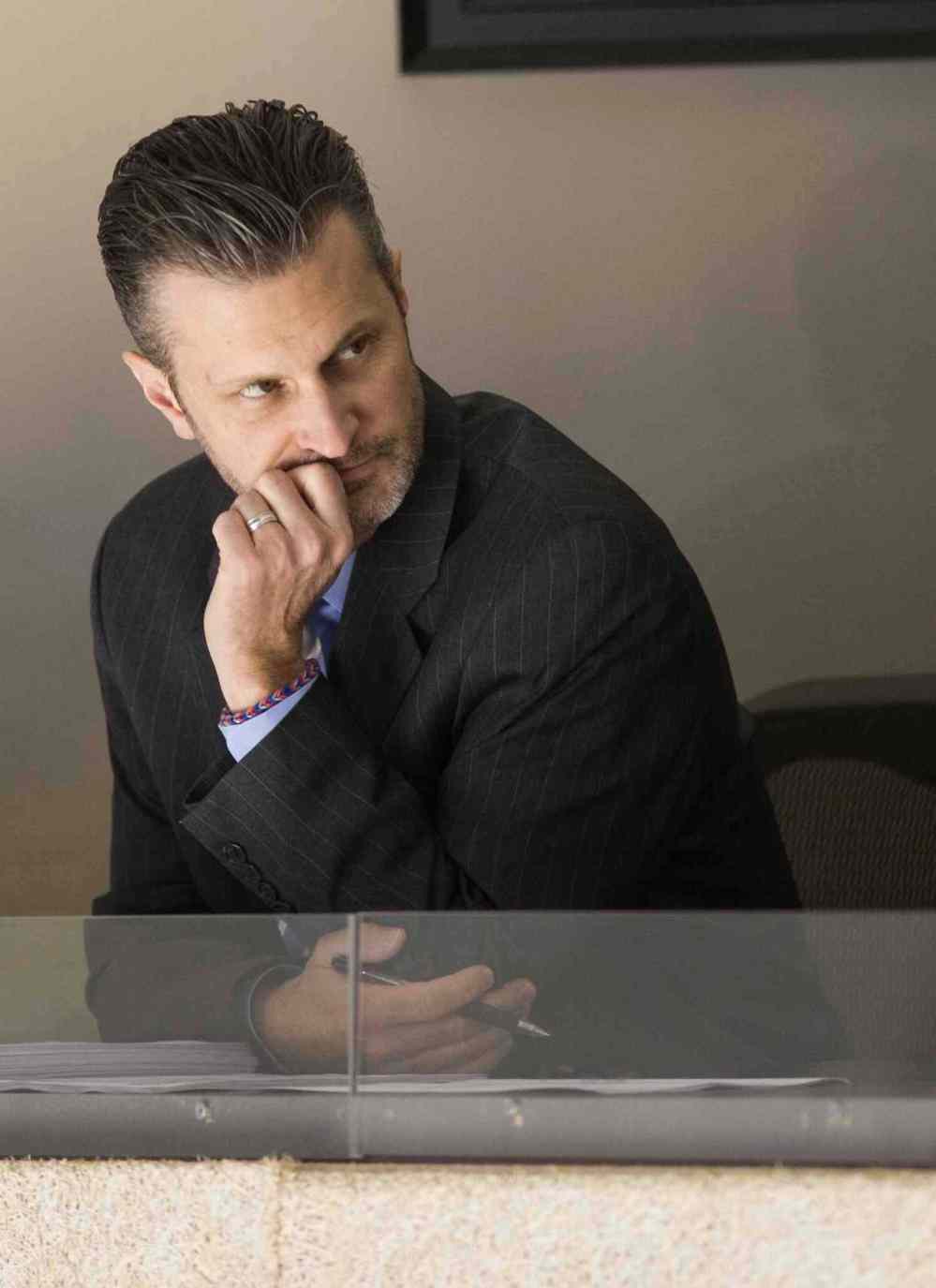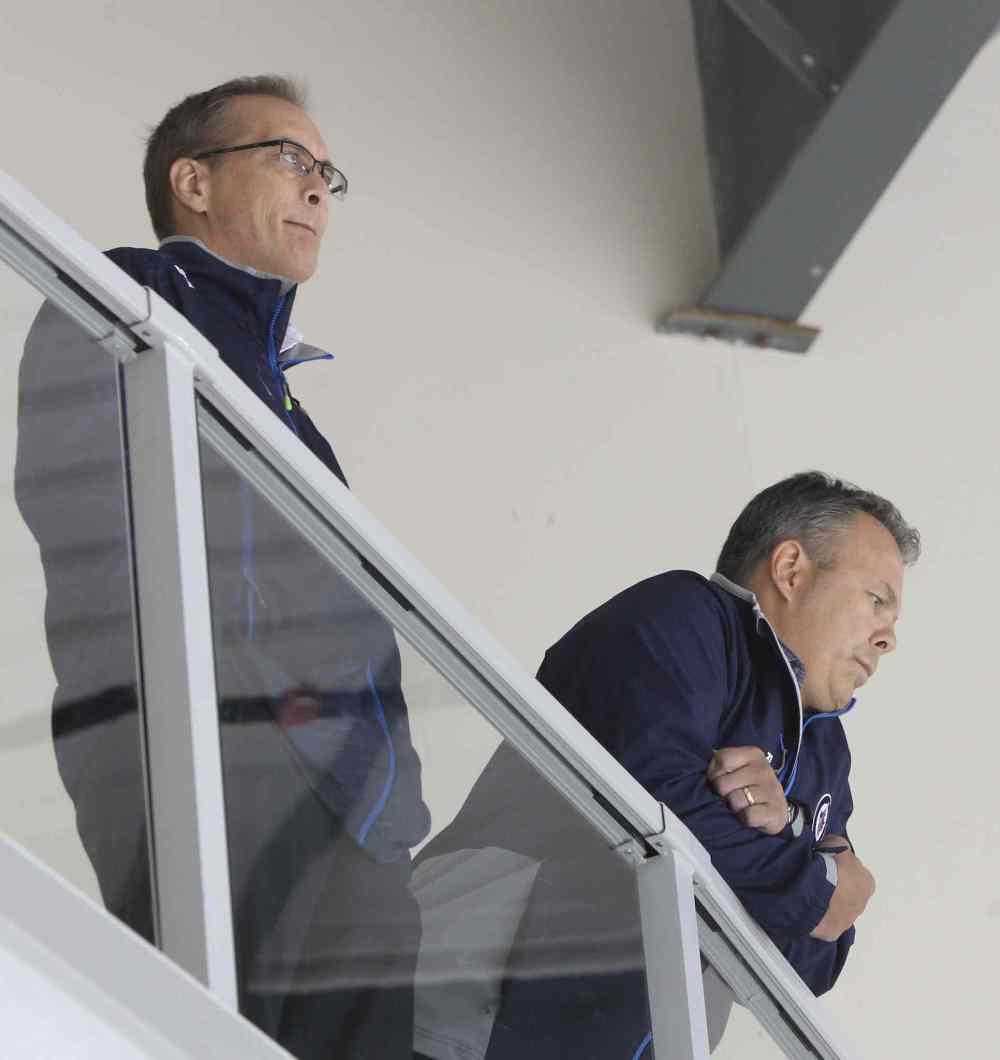The Architect
Criticized for being methodical, but Chevy's methods led the Jets to the playoffs
Advertisement
Read this article for free:
or
Already have an account? Log in here »
To continue reading, please subscribe:
Monthly Digital Subscription
$1 per week for 24 weeks*
- Enjoy unlimited reading on winnipegfreepress.com
- Read the E-Edition, our digital replica newspaper
- Access News Break, our award-winning app
- Play interactive puzzles
*Billed as $4.00 plus GST every four weeks. After 24 weeks, price increases to the regular rate of $19.00 plus GST every four weeks. Offer available to new and qualified returning subscribers only. Cancel any time.
Monthly Digital Subscription
$4.75/week*
- Enjoy unlimited reading on winnipegfreepress.com
- Read the E-Edition, our digital replica newspaper
- Access News Break, our award-winning app
- Play interactive puzzles
*Billed as $19 plus GST every four weeks. Cancel any time.
To continue reading, please subscribe:
Add Winnipeg Free Press access to your Brandon Sun subscription for only
$1 for the first 4 weeks*
*$1 will be added to your next bill. After your 4 weeks access is complete your rate will increase by $0.00 a X percent off the regular rate.
Read unlimited articles for free today:
or
Already have an account? Log in here »
Hey there, time traveller!
This article was published 10/04/2015 (3829 days ago), so information in it may no longer be current.
Back in Year 1 of Jets 2.0 during a ridiculous 9-8 win over the Philadelphia Flyers, GM Kevin Cheveldayoff was seated a little too close to the media and every reaction, some not so PG, could be clearly heard. The dispassionate and buttoned-down front put on display, it belies a very emotional competitor.

The nose, kinda bent and mushed over to one side, that didn’t happen poring over salary charts and scouting reports. Check out Cheveldayoff’s statistics from junior hockey with the Brandon Wheat Kings and in minor pro. Four seasons with more than 200 penalty minutes. That usually only happens one way and that’s by fighting for a big part of your living.
Complex is a good way to describe Cheveldayoff. He’s tough, patient, smart, stubborn and creative.
“He was a very good fighter and a very willing fighter. He’d protect his teammates and he was a great captain. I was only 28 when he was here in Brandon and got to coach him. He was already a man at 16 when he got here. His father died when he was young and Chevy had to grow up in a hurry. He did,” says Brandon Wheat Kings owner/GM/coach Kelly McCrimmon, who coached Cheveldayoff during the 80s.
“His mother was a school teacher and a very bright lady. Back then the Optimist Club had speaking competitions and Chevy took part. He was scholastic player of the year in our league. He’s extremely intelligent.”
During his time as assistant GM with the Chicago Blackhawks he mastered the CBA and was the organization’s primary financial planner on the hockey side.
Championships follow him around. He’s won Cups in the AHL, IHL and NHL.
Jets chairman Mark Chipman interviewed just one man to be GM of his team after he purchased the Atlanta Thrashers for relocation to Winnipeg.
It hasn’t been all wine and roses for Cheveldayoff atop the Jets. He’s been criticized for sticking to his plan — being too methodical and overly cautious in his remodelling of the Jets. But those cries ring hollow today. The Jets have one of the most promising crops of prospects in the NHL and a young burgeoning team with a playoff ticket.
Here’s Kevin Cheveldayoff on the morning after his Jets clinched their first Stanley Cup playoff berth:
Free Press: How do you feel this morning?
Kevin Cheveldayoff: A lot of it hasn’t sunk in yet because there’s so much to do, in planning and prep. It’s like anything you do on this team, you take the moment, you live in the moment, you enjoy it for that moment — but the next thing is the most important thing…
We were all together when we found out that Calgary beat L.A., so those are the kind of moments that you relish and enjoy. And to hear the emotion in the players voices, to see the emotion in the coaches, that’s what it’s about.
It’s an 82-game marathon, it really is, because if you go back throughout the year — the highs and the lows and the ‘Oh man, this is going to happen for sure to them — and the ‘Oh man, this is never going to happen,’ the ability to be able to sustain that, ultimately is the accomplishment of getting into the playoffs.

It’s no easy feat, so it’s something to savour for the moment. But again, having been fortunate enough to win a Stanley Cup, I know the prize at the end of the journey is well worth it, and this is the first step in the journey.
FP: Who was the first guy you hugged last night?
KC: Again, we were all kind of right around each other there, and they scored the empty-netter and there was 51 seconds left or something like that, and the kind of guy I am, I wouldn’t shake anybody’s hand till the clock struck zero, so, Larry Simmons, I think, was the first guy I was able to embrace as we were kind of standing right there.
Larry and I go back a long way, personally and professionally. You could have put a camera inside the room during the trade deadline and the trading period, and the amount of effort and time that went in to making deals, and stuff like that, having him stand right there was pretty appropriate.
FP: When did you decide this team and this season was the time for you to make a bigger push?
KC: It’s interesting. We were 1-4 at the beginning of the season and (Jets owner) Mark (Chipman) and I spoke at the Manitoba Club and it was interesting. The words came out of my mouth — and I really believed them — I said whether we were 1-4 or 4-1, you felt that there was something within this group that could be special.
At the time, it seemed like mere hollow words, that you’re standing up there trying to put a good spin on something, but the reality is that the guys battled back and every time there was a hit or a curve ball or something that was thrown at them, they found a way to battle back. It wasn’t really one defining thing, it’s just more the culmination of the fact that these guys didn’t want to be denied.
That doesn’t necessarily mean that you’re going to be able to do something, and I can’t really stress that enough. There’s times when you want to do things and nothing falls into place, and you have to live with it, because that’s the National Hockey League.“A team isn’t just a bunch of players or people assembled together, a team is like family.”
But we were fortunate. We had some pieces internally that really helped come through, in guys that we called up that fit right in that were ready to play, and we were fortunate to make some deals that added some depth and some chemistry, and again, hats go off to the coaches that fit players into a room.
You have to find a way to build a team. A team isn’t just a bunch of players or people assembled together, a team is like family, and you have to find a way to make that family coexist.
FP: Ondrej Pavelec has been your most criticized player but one of your most important your push for the playoffs. What are your emotions today where he’s concerned?
KC: It certainly has (been a great moment for Pavelec), and it was nothing that was handed to him. Any time an athlete can walk through the dark days and then have success – at whatever level, whether it’s short-term, long-term, it shows the fortitude of a player.
That’s the reality of this game, of professional athletes, they often get criticized, they often get lauded, both probably to extremes that they have to learn how to handle, and, in a Canadian market, there are those extremes, from morning to evening, there’s those kind of extremes sometimes. It’s something that players grow from, and have to grow, and if you want to call it, it’s a hazard of the job, being a professional athlete, that you have to be able to handle it or it doesn’t work.
I’m real proud of the fact that, down the stretch, he played the way he did, given the circumstances of all of those things.
The reality is that, on the management side, too, you have to, I don’t want to say tune it out because that’s not necessarily the right thing, you just have to be able to not let emotion dictate your thoughts, because there’s always that inner fan in you that, again, if you let that emotion run with you. That’s when you can find yourself with some sort of remorse.
FP: What will being in the playoffs means to the Jets, both players and as an organization?
KC: It’s another level of experience that all of these players have.
Andrew Ladd has won two Stanley Cups, and he’s going to bring that to the room, and those are personal experiences for him. Now these are experiences that he can draw upon and help this group learn from his experiences.“It’s about the players. They’re the ones that go out there, that play, they lay it on the line, they block shots, that get stitches to the face.”
That’s really the essence of what’s going on here. You have to give opportunities to players to experience it. Whether it’s a young guy, you have to give him an opportunity to be in the league, to make some mistakes, and still know that he’s going to go over the boards so that he can get better. The only way you can give a team or an organization experience is by having them go through it.
This will be a huge experience for every person in the organization because there’s lots that goes on behind the scenes on the business side that cannot be forgotten, and if those things don’t happen, we don’t happen, so those things have to work in harmony.
But on the ice, it’s that experience that everyone talks about. You go into training camp working your butts off all year to be able to get the opportunity to play for the Stanley Cup, and you hear the cliche “All you gotta do is get in,” and that’s true, and I think the guys really believe that, and it’ll be another experience that we’ll be able to draw upon as we continue to build the franchise.

FP: What’s it like being GM of the Jets this morning?
KC: It was interesting to be able to get up. My kids are pretty excited, my wife is pretty excited. They put so much behind-the-scenes sacrifice into it.
It’s my dream, this is my dream job and you want to be a GM in the National Hockey League, and to be a GM in a Canadian market that eats, sleeps, and breathes this is great, but it’s not really about me.
If you ask (Jets head coach) Paul (Maurice), if you ask anybody, it’s about the players. They’re the ones that go out there, that play, they lay it on the line, they block shots, that get stitches to the face. Seeing Andrew Ladd at the end of the game with stitches in his face. Seeing Blake Wheeler still wearing that cage, seeing what he had to sacrifice to get to this point here.
Man, I tell you what… They get paid a lot of money, there’s no question, but the sacrifices that they put the body through is remarkable. To put your body on the line in a sport to win that big silver trophy is a special feeling.
FP: Recently you told me you were excited for the city of Winnipeg to experience the playoffs. What did you mean by that?
KC: I think pro sports are an interesting thing. You hear all the things about guys making money, you go through work stoppages, you go through different things, there’s lots of different storylines all the time. But for me the goal to be in pro sports to win a championship. What pro sports and what this team means to the city, it’s special.
Pro sports gives some people something to rally around. These people in this city, they work hard, they go to their jobs, they lay their butts on the line every day, they put in their hours, and it gives them something to enjoy and it gives them something to call their own, and that’s what sports is about, to cheer for, maybe immerse yourself in a different fashion than what you do on a daily basis.“We may be the smallest city in the National Hockey League. We may not have the biggest building or the biggest market. But we’ve got the biggest hearts.”
It just goes to the essence of sports and sporting teams and what they do.
I was very proud to see, when the team came here, to see the crowd get together like it did, and you see the Jets logo wherever you go in this town. But to see the Jets logo wherever you go in this country now, and in this league, and you hear “True North” belted out at road games.
The guys talk about that, they know that, they hear it, and that’s because of this city. We may be the smallest city in the National Hockey League. We may not have the biggest building or the biggest market. But we’ve got the biggest hearts. The guys don’t win every night on the ice, but they do try to go out there and win every night on the ice. I think the fans realize it and appreciate it.
FP: How do you think you’ll react to the Whiteout?
KC: I don’t know. It’ll be like the first time you heard “True North” belted out. Until it happens, I honestly can’t tell you what it’ll be like, but I tell you what, I’m looking forward to see what that experience feels like.
FP: Can the Jets be a dangerous team in the playoffs?
KC: Well, I know what we are. We are a big team, we do play hard, and we play fast. From the moment that Paul (Maurice) and I sat down and talked about the group, we talked about what attributes we had and what we can be and what want to be and what we need to be to be successful.
Paul and his staff have brought a lot of those attributes out on a nightly basis. That’s what we are, that’s what has got us here, and that’s what I think can lead to us having some success.
Now, you’ve got to have some luck along the way here on the injury side of it. At the end of the day, when you win a championship, and you take that deep breath after, and you look back, and you go, “Man, there’s so many things that needed to fall in to place for this to happen to us.”
It’s a long journey, it’s a two-month journey, there’s going to be lots of ups and downs about it here. As weird as this sounds, some of the things we went through over the last several weeks here — I’m not talking about the wins, I’m talking about the losses, the hard losses — I think that helps us now.
It certainly hurt us at the time, and the ability to wake up the next morning and park it, and let that emotion go yet not let it drive you to do something — and I’m talking about the players more so than any of us — being able to park a hard loss and go out and play the next day is essential for the playoffs.
History
Updated on Saturday, April 11, 2015 10:43 AM CDT: Adds dropped word in third section from the bottom.






